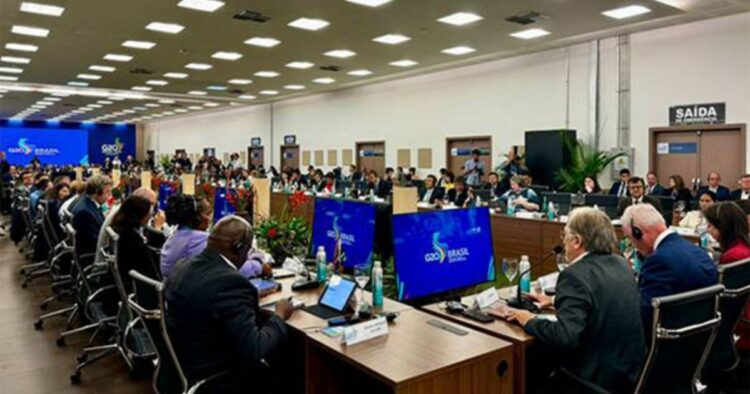On Friday, July 26, the G20 Labour and Employment Ministers (LEMM) concluded their meeting in Fortaleza, Brazil, with the approval of the Labour and Employment Ministerial Declaration. This important declaration was finalized after a two-day discussion held from July 25-26, under Brazil’s presidency of the G20.
The Indian delegation, led by Shobha Karandlaje, the Minister of State for Labour and Employment, played a significant role in these discussions. Brazil, along with India and South Africa, formed the G20 troika, which includes the countries hosting the G20 meeting before, during, and after the current year. Before the LEMM meeting, the 5th Employment Working Group (EWG) meeting took place on July 23-24, where the final text of the declaration was prepared.
During the two-day LEMM meeting, ministers focused on several crucial issues. They discussed ways to ensure a “Just Transition” to greener economies, create high-quality jobs, and promote decent work conditions that would lead to social inclusion and help eradicate poverty and hunger. Other key topics included gender equality, workplace diversity, and using technology to improve people’s lives.
The declaration highlights the need for governments to adopt active inclusion policies that support strong, sustainable, and balanced economic growth. It acknowledges that creating formal jobs and ensuring decent work are vital for fair income distribution.
The document emphasizes the importance of effective labour market policies, including skills development, training, lifelong learning, and job matching, which should align with economic needs and involve social partners.
Governments are urged to focus on formalizing jobs, addressing issues related to platform work, ensuring adequate wage floors, providing social protection, and supporting social dialogue and collective bargaining.
In her opening remarks, Karandlaje stressed the need for effective strategies for a fair transition to greener alternatives. She highlighted that such transitions should be supported by a strong social protection framework, retraining programs, and investments in sustainable industries to avoid job losses and economic instability.
Karandlaje also noted India’s progress in various areas, such as creating national missions for solar energy, energy efficiency, sustainable agriculture, and climate change. She mentioned the Sector Skill Council for Green Jobs (SSCGJ) as vital for developing a skilled workforce in these emerging sectors. She reported that India had created over 80 million jobs between 2017-18 and 2021-22, with youth unemployment decreasing significantly from 17.8% to 10% during this period.
On gender equality and diversity, Karandlaje highlighted India’s legislative measures, including the Sexual Harassment of Women at Workplace Act, the Equal Remuneration Act, and the extension of maternity leave from 12 to 26 weeks. She also discussed India’s initiatives in using technology to enhance quality of life, such as the Digital India Mission, the e-Shram portal for informal workers, and Aadhaar’s role in financial inclusion.
During the meeting, Karandlaje also met with Gilbert Houngbo, Director General of the International Labour Organization (ILO), and Japanese State Minister for Health, Labour, and Welfare, Miyazaki Masahisa. They discussed ways to improve the mobility of semi-skilled and skilled workers from India to Japan.
The G20 LEMM meeting in Fortaleza addressed significant issues related to employment and labour policies, emphasizing the importance of inclusive and sustainable economic growth.

















Comments